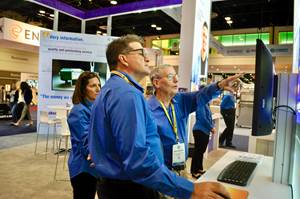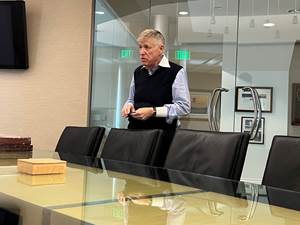Thermoformer Tosses Gauntlet to Injection Molders
Profile Plastics in Lake Bluff, Ill., has prospered for 43 years as a heavy-gauge custom thermoformer by investing steadily in the latest technology and then applying it in highly practical ways.
Profile Plastics in Lake Bluff, Ill., has prospered for 43 years as a heavy-gauge custom thermoformer by investing steadily in the latest technology and then applying it in highly practical ways. An example of this approach is its recent purchase of an unconventional vacuum-forming machine from Geiss Thermoforming USA, Elk Grove Village, Ill. The German-made unit is one of the first halogen-heated, in-line, closed-chamber-style machines in the U.S.
“Forming thrives on one-of-a-kind projects involving intense collaboration,” says Stephen Murrill, owner and president of Profile Plastics since 1987. His plant runs 24/7, with 80 employees operating about a dozen vacuum- and pressure-forming machines.
Murrill, 54, a native of Parkersburg, W.Va., and son of a DuPont Co. official, got an early taste of processing in a high school program that involved ABS part prototyping. He later earned a chemical engineering degree at Purdue University and sold PP resin for Exxon Corp. Murrill credits lessons from these experiences for the disciplined approach he now takes to running his own business.
Profile Plastics specializes in large, technical parts for medical, analytical, and electronic equipment, as well as appliances and materials-handling components. In a decade, it has won no fewer than 11 Society of Plastics Engineers (SPE) industrial part design awards. The firm’s newly acquired Geiss machine is meant to help maintain that momentum, one goal being to benchmark its efficiency versus standard three-station rotary equipment. Geiss’ halogen heating will be exploited to extend Profile’s use of heat-sensitive materials.
Competing with injection
Murrill’s goal in buying Profile was to thermoform parts equal to injection molding in look, quality, and precision, yet surpassing them in design ingenuity and economy. At the outset, process limits barred his way. Initial deficits included inability to trim parts with precision equal to injection moldings and difficulty in measuring part dimensions in order to guarantee quality on a repeatable basis.
Luckily, the rise of multi-axis CNC routers provided a way to address trim speed and precision. Profile was an early advocate of these machines and pioneered their use in thermoforming in the late 1980s. The guiding spirit was chief engineer Stephen Sweig, whose accomplishments included improving the controls and reducing set-up and changeover times for CNC machines. Virtually all Profile’s parts are now CNC trimmed.
By the mid-1990s, Profile was addressing precision measurement by investing in coordinate measuring machines (CMMs)—computer-aided devices for measuring critical part parameters on a repeatable basis. CMMs allowed Profile to go after more demanding applications.
A recent emphasis has been hollow parts, where twin-sheet forming has inherent advantages over competing processes. Profile operates three dedicated twin-sheet pressure formers and has other machines usable for both twin- and single-sheet projects. The company won an SPE award for a twin-sheet surgical helmet that incorporated an air-flow plenum and reduced 14 parts to one.
Sales director Ed Probst says Profile targets parts with layflat surface areas between 1 and 130 sq ft and production volumes of 1000 to 20,000 parts/yr. Profile’s strategy is to work with long-term, dependable customers. Murrill defines long-term as a relationship over at least three years, depending on part size and complexity. He cites the example of a bicycle workout machine housing for a recreational equipment customer. That product ran for eight years, averaging 8000 units/yr.
Profile has also been adept at hiring and retaining first-rate personnel, especially talented engineers able to husband complex programs to reality. Two who stuck with Profile since Murrill bought it 16 years ago are Probst and quality director Fred Steiner. Another veteran is Stephen Sweig, recipient of last year’s SPE “Thermoformer of the Year” Award, who was cited for advances in CNC trimming and twin-sheet forming. Murrill says the loyalty of Profile’s employees is a major factor in its ongoing success.
Related Content
ExxonMobil Develops High-Performance, 95% PE Recyclable Thermoformed Packaging
The packaging solution involved a collaboration with equipment suppliers Hosokawa Alpine and Multivac Group.
Read MoreInteractive Training for Injection, Extrusion and Other Processes
Paulson has four in-booth stations demonstrating its various training solutions.
Read MoreThermoformed Container Keeps Battery Cells Safe
Despite last-minute design changes and other unexpected roadblocks, thermoformer TriEnda works with a key supplier on innovative reusable shipping container.
Read MoreUS Merchants Makes its Mark in Injection Molding
In less than a decade in injection molding, US Merchants has acquired hundreds of machines spread across facilities in California, Texas, Virginia and Arizona, with even more growth coming.
Read MoreRead Next
Beyond Prototypes: 8 Ways the Plastics Industry Is Using 3D Printing
Plastics processors are finding applications for 3D printing around the plant and across the supply chain. Here are 8 examples to look for at NPE2024.
Read MoreMaking the Circular Economy a Reality
Driven by brand owner demands and new worldwide legislation, the entire supply chain is working toward the shift to circularity, with some evidence the circular economy has already begun.
Read MoreSee Recyclers Close the Loop on Trade Show Production Scrap at NPE2024
A collaboration between show organizer PLASTICS, recycler CPR and size reduction experts WEIMA and Conair recovered and recycled all production scrap at NPE2024.
Read More














